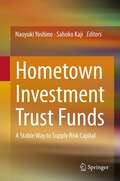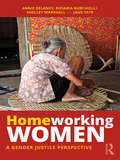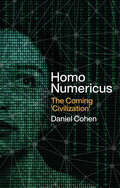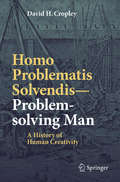- Table View
- List View
Hometown Investment Trust Funds
by Naoyuki Yoshino Sahoko KajiThis book records the first success stories of a new form of financial intermediation, the hometown investment fund, that has become a national strategy in Japan, partly to meet the need to finance small and medium-sized enterprises (SMEs) after the devastating earthquake and tsunami in March 2011. The hometown investment fund has three main advantages. First, it contributes to financial market stability by lowering information asymmetry. Individual households and firms have direct access to information about the borrowing firms, mainly SMEs, that they lend to. Second, it is a stable source of risk capital. The fund is project driven. Firms and households decide to invest by getting to know the borrowers and their projects. In this way the fund distributes risk but not so that it renders risk intractable, which was the problem with the "originate and distribute" model. Third, it contributes to economic recovery by connecting firms and households with SMEs that are worthy of their support. It also creates employment opportunities, at the SMEs as well as for the pool of retirees from financial institutions who can help assess the projects. Introduction of the hometown investment fund has huge global implications. The world is seeking a method of financial intermediation that minimizes information asymmetry, distributes risk without making it opaque, and contributes to economic recovery. Funds similar to Japan's hometown investment fund can succeed in all three ways. After all, the majority of the world's businesses are SMEs. The first chapter explains the theory behind this method, and the following chapters relate success stories from Japan and other parts of Asia. This book should encourage policymakers, economists, lenders, and borrowers, especially in developing countries, to adopt this new form of financial intermediation, thus contributing to global economic stability.
Homeworking Women: A Gender Justice Perspective
by Shelley Marshall Annie Delaney Rosaria Burchielli Jane TateHomework; work that is categorised as informal employment, performed in the home, mainly for subcontractors and mostly undertaken by women. The inequities and injustices inherent in homework conditions maintain women’s weak bargaining position, preventing them from making any improvements to their lives via their work. The best way to tackle these issues is not to abolish, but to bring equality and justice to homework. This book contributes a gender justice framework to analyse and confront the issues and problems of homework. The authors propose four justice dimensions – recognition, representation, rights and redistribution – to examine and analyse homework. This framework also takes into account the structures and processes of capitalism and the patriarchy, and the relations of domination that are widely held to be the major factors that determine homework injustice. The authors discuss strategies and approaches that have worked for homeworkers, highlighting why they worked and the features that were beneficial for them. Homeworking Women will be of interest to individuals and organisations working with or for the collective benefit of homeworkers, academics and students interested in feminism, labour regulation, informal work, supply chains and social and political justice.
Homewreckers: How a Gang of Wall Street Kingpins, Hedge Fund Magnates, Crooked Banks, and Vulture Capitalists Suckered Millions Out of Their Homes and Demolished the American Dream
by Aaron GlantzIn the spirit of Evicted, Bait and Switch, and The Big Short, a shocking, heart-wrenching investigation into America’s housing crisis and the modern-day robber barons who are making a fortune off the backs of the disenfranchised working and middle class—among them, Donald Trump and his inner circle. Two years before the housing market collapsed in 2008, Donald Trump looked forward to a crash: “I sort of hope that happens because then people like me would go in and buy,” he said. But our future president wasn’t alone. While millions of Americans suffered financial loss, tycoons pounced to heartlessly seize thousands of homes—their profiteering made even easier because, as prize-winning investigative reporter Aaron Glantz reveals in Homewreckers, they often used taxpayer money—and the Obama administration’s promise to cover their losses. In Homewreckers, Glantz recounts the transformation of straightforward lending into a morass of slivered and combined mortgage “products” that could be bought and sold, accompanied by a shift in priorities and a loosening of regulations and laws that made it good business to lend money to those who wouldn’t be able to repay. Among the men who laughed their way to the bank: Trump cabinet members Steve Mnuchin and Wilbur Ross, Trump pal and confidant Tom Barrack, and billionaire Republican cash cow Steve Schwarzman. Homewreckers also brilliantly weaves together the stories of those most ravaged by the housing crisis. The result is an eye-opening expose of the greed that decimated millions and enriched a gluttonous few.
Homicide: A Year On The Killing Streets
by David SimonThe scene is Baltimore. Twice every three days another citizen is shot, stabbed, or bludgeoned to death. At the center of this hurricane of crime is the city's homicide unit, a small brotherhood of hard men who fight for whatever justice is possible in a deadly world. David Simon was the first reporter ever to gain unlimited access to a homicide unit, and this electrifying book tells the true story of a year on the violent streets of an American city. The narrative follows Donald Worden, a veteran investigator; Harry Edgerton, a black detective in a mostly white unit; and Tom Pellegrini, an earnest rookie who takes on the year's most difficult case, the brutal rape and murder of an eleven-year-old girl. Originally published fifteen years ago, Homicide became the basis for the acclaimed television show of the same name. This new edition―which includes a new introduction, an afterword, and photographs―revives this classic, riveting tale about the men who work on the dark side of the American experience.
Homing In on Cash Conversion
by Karen Berman Joe KnightThe cash conversion cycle, introduced in this chapter, measures how effective a company is at collecting its cash. The cycle can be shortened by the techniques discussed: decreasing days of sales outstanding (DSO), decreasing inventory, and increasing days payable outstanding (DPO). This chapter is excerpted from "Financial Intelligence for Entrepreneurs: What You Really Need to Know About the Numbers."
Homing In on Cash Conversion
by John Case Karen Berman Joe KnightAccounts payable is a tough number to get right. This chapter discusses the cash conversion cycle, which measures how effective a company is at collecting its cash.
Homing the Machine in Architecture
by Galo Canizares Zach CohenHoming the Machine in Architecture is a series of conversations on the ways designers, practitioners, historians, and theorists orient themselves within the world of architectural digital fabrication.To “home” a digital fabrication machine is to send it back to its origin point—a point that can be specified by the fabricator in advance of the fabrication process or by the defaults that are pre-programmed into the machine. The homing process is necessary and productive since it determines the physical point at which the machine (and the maker) begin making—every time that architectural designers begin to digitally fabricate something new, they first need to home the machine. This book gathers first- and second-hand accounts of the origins of individual “digi-fab” practices from the emergence of advanced prototyping tools to the contemporary moment. It features interviews, essays, and case studies organized around three questions: What are the possible histories of digital fabrication in architecture? How do designers orient themselves in this emergent discipline? What conceptual original points do architectural designers return to when they home their machines?The discourse that emerges from this collection aims to reach practicing architects using digital fabrication, as well as upper-level students and academics of digital architecture, architectural theory, and architectural history.
Homo Creativus: The 7 C’s of Human Creativity (Creativity in the Twenty First Century)
by Todd Lubart Marion Botella Samira Bourgeois-Bougrine Xavier Caroff Jérôme Guegan Christophe Mouchiroud Julien Nelson Franck ZenasniThis book focuses on creativity and showcases a specific approach to creativity. It uses a new 7 C’s basis for understanding creativity (creators, creating, cooperation, context, creations, consumption, and curricula). This new approach to creativity is an extension of the 4 ‘P’ approach (person, process, press, and product) which has dominated the literature since the 1960s. In each section, there are two chapters, which illustrate work on the topic and focus on some key issues.
Homo Curator: Towards the Ethics of Consumption (Virtues and Economics #8)
by László Zsolnai Agnieszka Wincewicz-Price Péter RónaThis book explores the under-researched sources of the consumerist culture and the environmental damage it has brought about. The book is an outcome of the symposium on “The Ethics of Consumption” organised and hosted by the Las Casas Institute at the Blackfriars Hall, University of Oxford as part of its Economics as a Moral Science Programme. It takes on two contemporary problems: the human weakness and capacity for wrong-doing, and the failure of modern economic theory to account for the moral character of human behaviour and its implicit encouragement of gluttonous life-styles. In a time when grand political schemes are proposed to revive sustainability of global economy, the authors of the papers collected in this book highlight the need for moral renewal without which the most revolutionary structural reforms are bound to fail at producing the desired outcome. Topics of the book include the meaning and sources of avarice, the attempt to define what is enough, exploration of philosophical and theological perspectives which can serve as building blocks for the ethics of consumption. This makes the book of great interest to a broad readership of economists, social scientists and philosophers.
Homo Emotionalis: On the Systematization of Emotions in Politics
by Timm BeicheltIn this book, important works and approaches of policy-oriented emotion research are brought into a systematic context. For this purpose, three different types of emotions are elaborated, which in their totality constitute Homo Emotionalis: binary emotions, basic emotions, reflexive emotions. They correspond to individual-psychological stages of development, but are also relevant in the social and political handling of emotions. The interplay of emotion types and social constellations leads to different modes of political action, which shape different forms of emotional politics. In each case, individual logics emerge along which emotional politics is pursued. With its interdisciplinary focus, this volume is aimed at political scientists, anthropologists, sociologists and social psychologists.
Homo Emotionalis: Zur Systematisierung von Gefühlen in der Politik
by Timm BeicheltIn diesem Buch werden wichtige Werke und Ansätze der politikorientierten Emotionenforschung in einen systematischen Zusammenhang gebracht. Dafür werden drei unterschiedliche Typen von Emotionen herausgearbeitet, die in ihrer Gesamtheit den Homo Emotionalis ausmachen: binäre Emotionen, Basisemotionen, reflexive Emotionen. Sie entsprechen individualpsychologischen Entwicklungsstufen, sind aber auch im sozialen und politischen Umgang mit Emotionen relevant. Das Zusammenspiel von Emotionentypen und gesellschaftlichen Konstellationen führt zu verschiedenen Modi politischen Handelns, die unterschiedliche Formen von emotionaler Politik prägen. Es entstehen jeweils eigene Logiken, entlang derer Emotionenpolitik betrieben wird. Der Band richtet sich mit seinem interdisziplinären Fokus an Politikwissenschaft*innen, Anthropolog*innen, Soziolog*innen und Sozialpsycholog*innen.
Homo Numericus: The coming 'civilization'
by Daniel CohenFrom Amazon to Tinder, from Google to Deliveroo, there is no facet of human life which the digital revolution has not streamlined and dematerialised. Its objective was to reduce the cost of physical interactions by forgoing face-to-face interactions, a direct result of the free-market shock of the 1980s, which sought to seamlessly expand the marketplace in every possible dimension. Today, we can be algorithmically entertained, educated, cared for and courted in a way which was impossible in the old industrial society, where institutions structured the social world. Today, these institutions have been replaced by monetised virtual contact. As with the industrial revolution of the past, the digital revolution is creating a new economy and a new sensibility, bringing about a radical revaluation of society and its representations. While obsessed with the search for an efficient management of human relations, the new digital capitalism gives rise to an irrational and impulsive Homo numericus prone to an array of addictive behaviours. Far from producing a new agora, social media produce a radicalization of public debate in which hate-filled speech directed against adversaries becomes the norm. The good news is that these outcomes are not inevitable. Technologies have not taken control of our lives. The digital revolution also offers an alternative path: one that leads to a world in which every word deserves to be listened to, without a transcendent truth hanging over it. Are we able to seize the new opportunities opened up by the digital revolution without succumbing to its dark side?
Homo Problematis Solvendis–Problem-solving Man: A History of Human Creativity
by David H. CropleyThis book presents the history of modern human creativity/innovation through examples of solutions to basic human needs that have been developed over time. The title – Homo problematis solvendis – is a play on the scientific classifications of humans (e.g. Homo habilus, Homo erectus, Homo sapiens), and is intended to suggest that a defining characteristic of modern humans is our fundamental ability to solve problems (i.e. problem- solving human = Homo problematis solvendis). The book not only offers new perspectives on the history of technology, but also helps readers connect the popular interest in creativity and innovation (in schools, in businesses) with their psychological underpinnings. It discusses why creativity and innovation are vital to societies, and how these key abilities have made it possible for societies to develop into what they are today.
Homomorphic Encryption for Financial Cryptography: Recent Inventions and Challenges
by Mariya Ouaissa Rajesh Kumar Dhanaraj V. Seethalakshmi S. SuganyadeviThis book offers insights on efficient utilization of homomorphic encryption (HE) for financial cryptography in confidentiality, phishing, anonymity, object and user identity protection. Homomorphic encryption has the potential to be a game-changer for the industry and cloud industry. HE method in cloud computing is presented in this book as a solution to increase the security of the data. Moreover, this book provides details about the set of fundamentals of cryptography, classical HE systems, properties of HE schemes, challenges and opportunities in HE methods, key infrastructure, problem of key management, key sharing, current algorithmic strategies and its limitation in implementation for solving complex problems in financial cryptography, application in blockchain, multivariate cryptosystems based on quadratic equations to avoid the explosion of the coefficients.
Homöopathie - die Fakten [unverdünnt]
by Edzard Ernst Jutta BretthauerHomöopathie und Wissenschaft Dieses Buch zeichnet die Entstehung der Homöopathie nach, erläutert ihre grundlegenden Prinzipien, klärt über die heutige Praxis auf und diskutiert die Gründe für die anhaltende Beliebtheit dieser Heilmethode. Vor zweihundert Jahren hatte die Medizin Kranken wenig zu bieten: Man ließ sie zur Ader oder verabreichte ihnen extrem starke Abführmittel – Praktiken, die den Krankheitsverlauf verkürzten, indem sie den Tod des Patienten beschleunigten. Vor allem als Reaktion auf diese brachiale und ineffektive Medizin entwickelte der deutsche Arzt Samuel Hahnemann im ausgehenden 18. Jahrhundert ein therapeutisches System, das er als Homöopathie bezeichnete. Während sich die Medizin seit jener Zeit enorm gewandelt und weiterentwickelt hat, wird die Homöopathie – mit ihren Wurzeln in Alchemie und Metaphysik – heute noch genauso praktiziert wie in Hahnemanns Tagen. Die Leser dieses Buches werden nicht nur die Geschichte der Homöopathie und ihrer fast magischen Anziehungskraft kennen lernen, sondern vor allem die rationale und wissenschaftliche Herangehensweise des Autors zu schätzen wissen, der in kompakter Form die gesamte Bandbreite der biologischen, chemischen und psychologischen Fragen beleuchtet, die diese Behandlungsform aufwirft.
Hon Hai's Investment in Sharp
by Mihir A. Desai Keith Chi-ho Wong Zachary MarkovichIn March 2012, Hon Hai Precision Industry Company, Ltd. (Hon Hai) announced its investment in the Sharp Corporation (Sharp). The deal was structured in two parts: the first had Hon Hai investing in Sharp, and the second involved Hon Hai founder and chairman and CEO Terry Guo personally purchasing a stake in Sharp's unprofitable Sakai manufacturing plant. This case explores the dynamics of the deal and specifically focuses on valuation of the investment in the Sakai plant as well as the structure of the deal. It presents a vehicle by which to consider net present value (NPV) calculations and corporate deal structuring.
Honda (A)
by Richard Tanner Pascale Evelyn T. ChristiansenDescribes the history of Honda Motor Company from its beginning through its entry into and subsequent dominance of the U.S. market. The history is explained primarily in terms of strategic factors and quoted from two sources: an earlier case and Boston Consulting Group report on the motorcycle industry. Should be used with Honda (B).
Honda (B)
by Richard Tanner Pascale Evelyn T. ChristiansenDescribes the history of Honda Motor Company from its beginning through its entry into and subsequent dominance of the U.S. market as seen through the eyes of Honda executives. The history of Honda's successful entry into the U.S. market is viewed as highly adaptive and fraught with error and serendipity. Honda (A) and (B) are designed to be used together to contrast two differing views of major events in a company's history, both of which are important for a general manager to understand.
Honda Innovations: Leveraging External Insights to Accelerate Creation
by Antonio DavilaNick Sugimoto, CEO of Honda Innovations-the open innovation organization of Honda, has to decide how to extend his organization's approach to innovation across the world. Honda Innovations dates back to 2000 when Honda created Honda Research Institute in Silicon Valley. Since then, the organization has evolved through various models from a venture capital fund to its current form as Honda's corporate innovation effort. The case describes the various approaches to innovation between Honda and outside firms and how it fits into an increasingly dynamic car industry.
Honda Today
by Marco Iansiti Barbara FeinbergDescribes a situation in which the manager in charge of a major development project at Honda needs to make a decision about the technical specification of the product. The decision has profound implications for the product concept and strategy, as well as for the technical feasibility and challenges of the design. The students need to evaluate different options and estimate their impact on the success of the final product. Underlines the importance of choosing an option that is consistent with the overall concept of the product and the company's design and philosophy.
Honda-Rover (A): Crafting an Alliance
by James K. Sebenius Ashish Nanda Ron S. FortgangFaced with vexing financial challenges in 1993, British Aerospace (BAe) is determined to shed its loss-making automaker, Rover. It offers to sell its stake in Rover to Honda, Rover's partner since 1979, but Honda is reluctant to raise its stake in Rover. Meanwhile, BMW approaches BAe with a confidential bid to buy out Rover. This case places these developments within the context of the history of the British auto industry, Rover's heritage, evolution of the Honda-Rover partnership, and the rationale for BMW's interest in Rover. The case series describes subsequent developments.
Honda-Rover (C): "The Sting"
by James K. Sebenius Ashish Nanda Ron S. FortgangSupplements the (A) case.
Honest Answers: Interview and Negotiation Skills to Get to the Truth
by Lena SiscoBECOME A MASTER AT NEGOTIATION AND COMMUNICATIONNever go into an important conversation feeling unheard, unprepared, or uninformed again—apply the proven SISCO method for communication to become a master negotiator, trusted interviewer, and engaging conversationalist. No matter the conversation, detecting honesty and persuading others to be honest are some of the most valuable skills you can learn. With these skills, you can master your daily conversations and interactions with others. The Strategic Interviewing Skills and Competencies (SISCO) Method will help you see the full picture, have all the facts, and make effective decisions.Former Navy interrogator, Lena Sisco, created this method during challenging investigative and information-gathering interviews. Her 5-step program focuses human-to-human interaction. When you can gain someone&’s trust you can get truth in any scenario. She teaches readers how to validate their gut feeling when they think someone is lying, unassumingly control a conversation, and persuade others to be honest.These skills are not only applicable in an interrogation room, but they can be relevant in everyday life. In this book, you will learn how to:Apply the strategic interviewing skills behind the SISCO method to your everyday life to discover the information and the honest answers you need.Create an environment of trust that will facilitate the fact finding necessary to be more effective at your job while encouraging others to be more accountable.Control the signals you may or may not be inadvertently sending to others.Know the right words to say during a disagreement in order to de-escalate conflict, gain respect, and create a win-win situationNot only does she teach you techniques and methods to negotiate and interview with confidence, she shares the neuroscience behind why they are effective. You will be able to interpret patterns of behavior and influence positive behaviors in others, as well as enhancing the effectiveness of your communication practices; both verbal and nonverbal.
Honest Signals
by Alex Sandy PentlandHow can you know when someone is bluffing? Paying attention? Genuinely interested? The answer, writes Sandy Pentland in Honest Signals,is that subtle patterns in how we interact with other people reveal our attitudes toward them. These unconscious social signals are not just a back channel or a complement to our conscious language; they form a separate communication network. Biologically based "honest signaling," evolved from ancient primate signaling mechanisms, offers an unmatched window into our intentions, goals, and values. If we understand this ancient channel of communication, Pentland claims, we can accurately predict the outcomes of situations ranging from job interviews to first dates. Pentland, an MIT professor, has used a specially designed digital sensor worn like an ID badge--a "sociometer"--to monitor and analyze the back-and-forth patterns of signaling among groups of people. He and his researchers found that this second channel of communication, revolving not around words but around social relations, profoundly influences major decisions in our lives--even though we are largely unaware of it. Pentland presents the scientific background necessary for understanding this form of communication, applies it to examples of group behavior in real organizations, and shows how by "reading" our social networks we can become more successful at pitching an idea, getting a job, or closing a deal. Using this "network intelligence" theory of social signaling, Pentland describes how we can harness the intelligence of our social network to become better managers, workers, and communicators.














